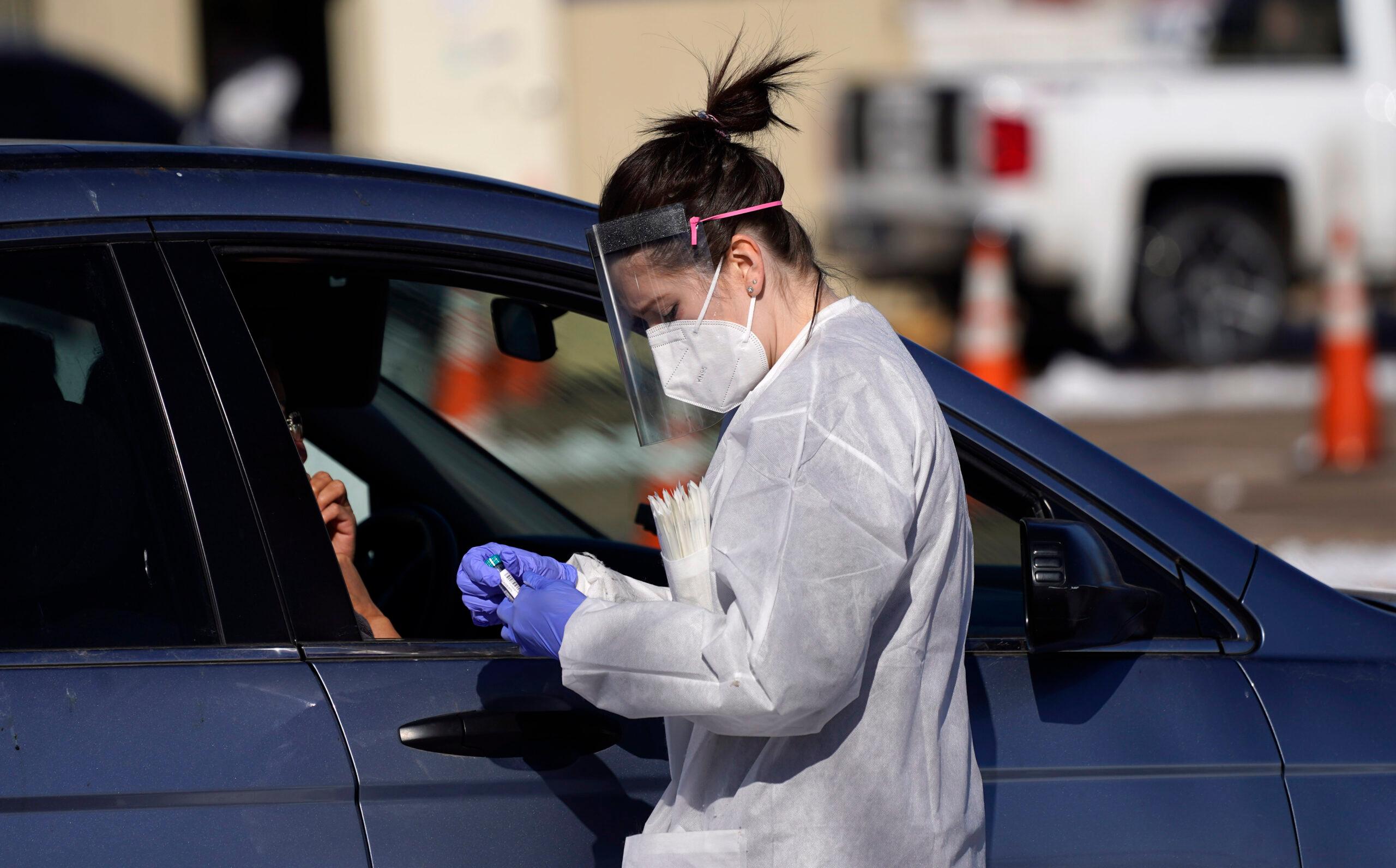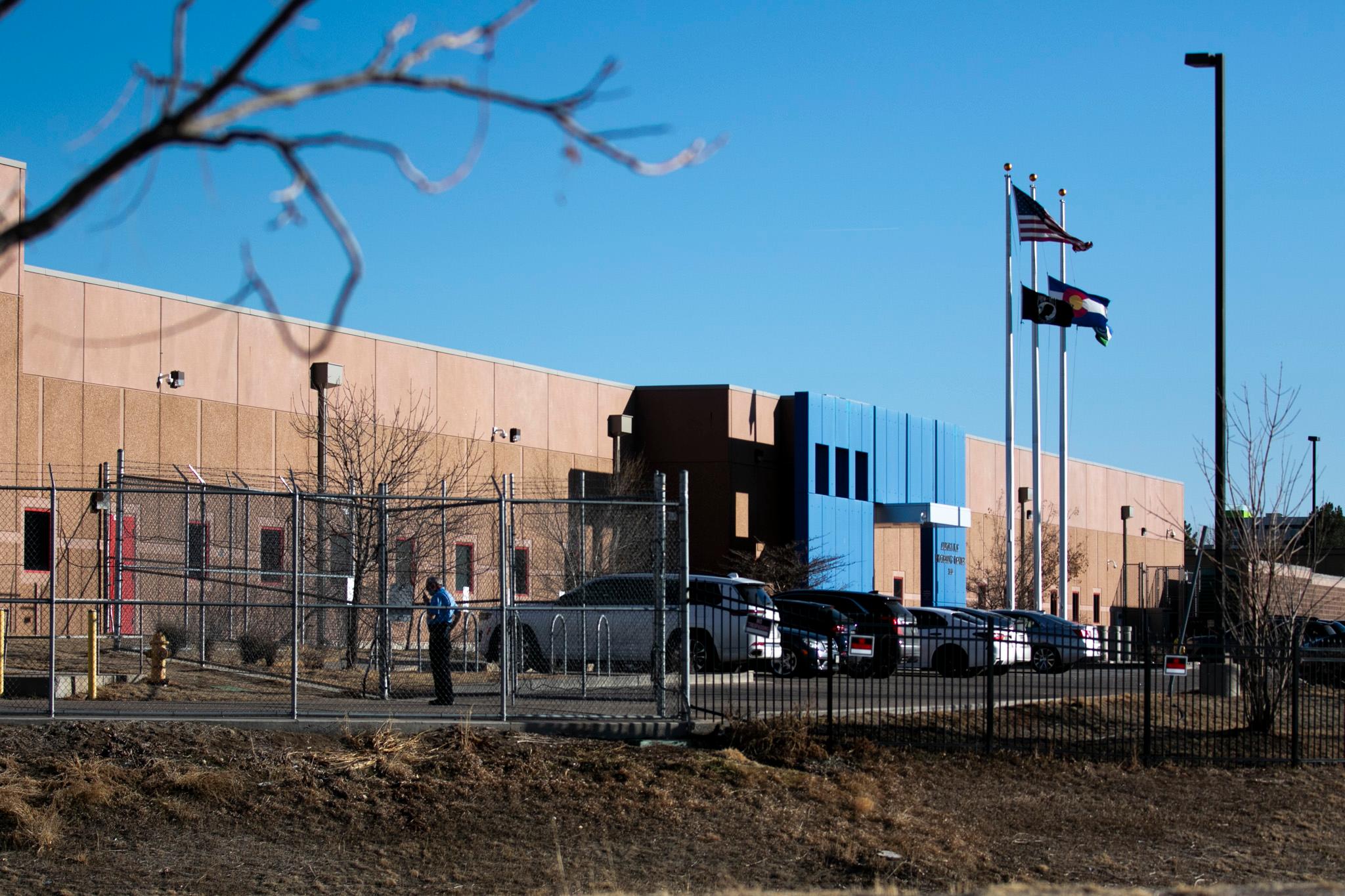
The state's local public health directors have implored Gov. Jared Polis to start enacting tougher measures to deal with COVID-19, including requiring county-by-county lockdowns where warranted.
“We are at a critical juncture in the COVID-19 pandemic,” reads a letter addressed to the Governor’s office and Colorado Department of Public Health and Environment, signed by the state’s metro public health directors and the president of the Colorado Association of Public Health Directors.
The letter, dated Nov. 5, was obtained by CPR News.
“Cases are increasing at an alarming rate. Contract tracing and investigation capacity is tapped. Hospitalization rates are at an all-time high since the pandemic began and are projected to exceed capacity by year’s end,” reads the letter.
The public health directors asked the state to follow its own framework and require counties with high rates of new cases to move through the color-coded categories as warranted by case increases, including putting counties in the red category, or “stay at home,” if necessary.
The county directors say they appreciate that the state is being cautious by delaying the imposition of strict public health orders, but they fear, at this point, it is doing more harm than good. And while the letter doesn't specifically list the names of counties that should be moved to lockdown, the desire of the local health directors is clear: More must be done.
“Paradoxically, the ultimate outcome of these delays could be a greater likelihood of moving to the Stay at Home level that we all want to avoid and/or a greater length of time required in Stay at Home to reverse the dramatic rates of growth,” reads the letter. “Like you and our county leaders, we would like to keep our community sectors and businesses as open as possible, but worry about delaying the ‘strong medicine’ of a Level change until it is too late to be effective.”
There are 13 counties now in the “orange” level, one step below lockdown, including Denver, Adams, Arapahoe, Boulder, Broomfield and Jeffco. All of them far exceed the state’s threshold for the rate of new cases necessary to avoid a lockdown.
During this “third wave” of the virus, only a handful of the more populous counties statewide have managed to stay beneath that level — a “two-week cumulative incidence” rate of 350 cases per 100,000 residents — though most of those have been able to keep hospitalizations within the state range, according to CDPHE data.
As of Tuesday morning, 36 counties - more than half the state - exceed that threshhold for new cases, according to state health department data. They include counties on all four of Colorado's borders, showing how this wave of the virus is reaching all parts of the state.
One of them is Prowers County, on the Kansas border, where, according to a releease from their health department, 10 residents of a nursing home there have now died with COVID-19. They are now among more than 2,400 people statewide who have died with the illness since the coronavirus was detected in Colorado in March. After a months-long lull, daily deaths are now beginning to rise again in the state.
Colorado recorded its third-highest number of cases in a day Sunday, with 3,301. The percentage of tests returning positive results for COVID-19, averaged over seven days, has now risen to 11.47 percent, up from 3.7 percent just one month ago.
There are 1,174 people with confirmed or suspected cases of COVID-19 hospitalized in Colorado, just below the high mark set in April, when 1,277 patients with confirmed and suspected cases were in the hospital.
The state has granted counties opportunities to let their caseloads fall back into acceptable levels, rather than issuing strict lockdown orders.
Local public health authorities have the authority to enact a stay at home in their counties, but “we think that that authority is more effective if it comes from the chief elected official in the state,” said John Douglas, M.D., the executive director of Tri-County Public Health, in an interview with CPR News.
Cases have grown so rapidly that the counties can no longer do effective contact tracing to try and slow or contain the spread.
“We just can't keep up with that at this point,” Douglas said. “We just don't have enough people to call everybody who's infected and do a case investigation. We don't have nearly enough people to do contact tracing.”
Polis press secretary Conor Cahill issued a statement late Monday indicating that the governor would only act on a statewide basis if that became necessary in dire circumstances, but that he would leave it to counties to follow the state's dial framework to make the best choices for their residents.
“We created the dial system because the virus is impacting communities in a different way, what is happening in Denver County is different than in Jackson County,” Cahill wrote. “It's important to remember that local jurisdictions have always had the ability to enact more restrictive policies than those outlined in the dial, and we need to trust that they will do what [sic] to protect the health and safety of their residents.”
“However, if there comes a time we could lose lives due to a lack of medical capacity, the governor will not hesitate to take statewide action.”
CDPHE representatives did not respond to a message from CPR News.
During a briefing for the state Monday, Polis expressed confidence that the end was in sight for the pandemic, but Colorado’s case numbers have grown concerning enough to attract attention from Washington.
“We had a visit from the White House coronavirus task force lead Dr. Deborah Birx last week, who told us that if we don't turn the corner, we're three, four weeks away from being in the same situation as North and South Dakota,” Douglas said.
Still, Polis, and his health department officials, have resisted moving counties into lockdowns, the economic consequences of which are devastating. And Douglas noted that without financial aid from Congress, businesses will have a more difficult time weathering a stay-at-home order, which complicates the decision in Colorado.
At his Monday briefing, Polis reiterated that the state is not going to press stay-at-home orders yet. He said people must be safe on their own, cancel gatherings over the next two weeks, limit interactions and wear a mask.
“That's the way to beat this thing, it's simple. And it's not about enforcement other than it's about the Grim Reaper is the ultimate enforcer,” said Polis, repeating the “Grim Reaper” line he used back in late March before finally enacting a statewide stay-at-home order. “More Coloradans will die if Coloradans don't simply cancel their social plans and wear masks in public.”
Polis said that counties have taken nuanced measures.
“We have great leaders in local government that are, they're looking at really getting a handle in their communities,” Polis said. “And there's many communities across the state that are making hard decisions to reduce the spread of the virus.”
Denver and Tri-County, for instance, have instituted curfews and limits on sports gatherings and restaurants, though public health officials admit there is little science that curfews work. As cases rise, there are fewer levers remaining to pull to get the virus under control.
But Douglas said it’s simply politically infeasible in many corners of the state for an unelected local health official to order a lockdown.
“I think all of my colleagues are getting weary of being the target of criticism, death threats, hostile comments,” Douglas said. “And so we'd all like to not have that sort of stuff coming to us, nobody who makes this decision, by the way, is going to be popular. The governor's not going to be popular if he makes it. We’re not going to be popular if we make it.”
But Douglas believes that there will be greater acceptance and consistency if the governor forced counties to stay at home since he is, “recognized as having the unequivocal authority to levy these things.”
Elena Rivera of KRCC contributed to this report









